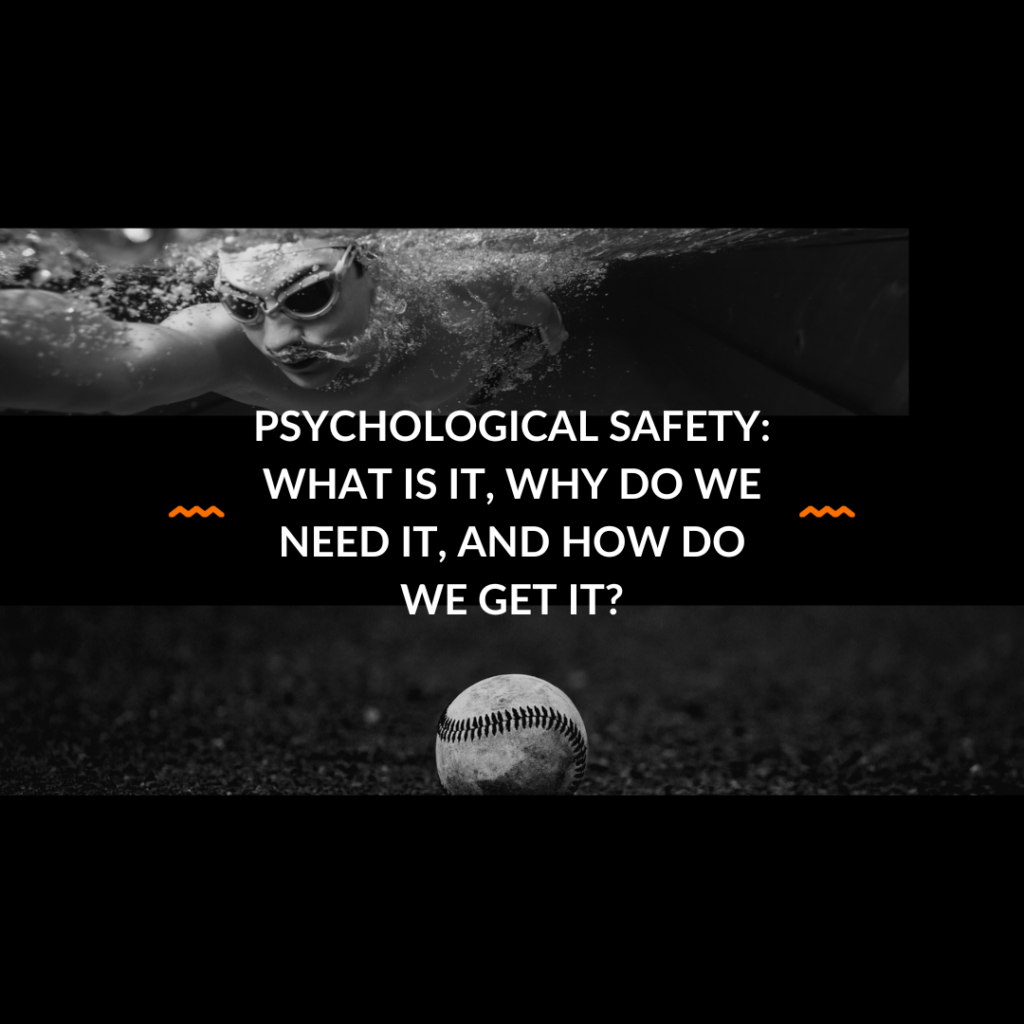In Episode 53 of The Freshman Foundation® Podcast, my guest Bill Eckstrom and I discussed the concept of psychological safety in the context of athletics. Psychological safety has a number of different definitions in the sport psychology literature. One definition that has been shared is:
“A social environment within which individuals take interpersonal risks by speaking up, sharing concerns, raising questions, and offering ideas because they feel safe to do so” (Jowett et al., 2023, p. 1).
Psychological safety is a big concept and one that might not be particularly well understood in the athletic context (Taylor et al. 2022). Some have suggested high performance and psychological safety are actually contradictory. However, my experience working with young athletes suggests that psychological safety is an absolutely critical ingredient to a positive sport experience, which includes performing well.
One of the most common issues that I address with my clients is that they often don’t know where they stand with a coach. For instance, the athletes may be confused by a decision, such as playing time, or generally don’t feel understood or supported in their individual development. Unfortunately, it seems to me that young athletes often don’t inherently trust their coaches enough to approach them for feedback. Rather, they rely on the coach to give them unsolicited feedback and frankly, just tell them what they need to do.
When student-athletes approach me with concerns about their coaches,, the first question that I often ask my clients is, “Do you think you could approach your coach to discuss your concerns?” Most athletes feel that approaching a coach is indeed a viable option, but it is clearly not something that is not natural for them. The typical concerns are that the athlete may hear something uncomfortable or worse, feel as though their outreach will be punished in some way.
Ultimately, I will help the young person preview the conversation with their coach so that they are prepared to knock on his or her door. We discuss not only what questions to ask, but how to frame those questions. Further, we preview responses and objections so that the athlete has less of a chance of getting thrown for a loop by something the coach says.
Almost invariably, when I ask my clients how they feel after having the conversation, they indicate that they feel relief. Knowing where they stand helps relieve them of the anxiety associated with the fear of the unknown even if the content of the feedback is critical. In essence, the student-athlete pursues a higher level of psychological safety by choice of their own volition.
So, why do young athletes need to approach their coaches to feel psychologically safe? Shouldn’t coaches just do that without prompting?
I will address the coaching side of the equation in a bit, but let’s explore the athlete’s role in the relationship in a bit more detail first.
There are certain key lessons that I consistently share with my student-athlete clients. First, it is critical to control the controllables. Coaches (and other people, in general) cannot be controlled (as much as we might like to…). Thus, if you are not getting what you need from a coach, then it is your choice about whether to ask for it. In an environment that does not seem psychologically safe, this might be really hard. Nevertheless, it is still a choice you can make.
Another lesson I teach young athletes is about empathy. Coaches are people. They have families, often have other jobs, and a wide array of responsibilities, including a team full of other student-athletes. They may not offer their help to you because they don’t actually know there is a problem. Further, they may be dealing with issues you know nothing about that affect their ability to perform as a coach. You may not like the job that your coach is doing, but you have the choice to understand why they might not be coaching you the way you need them to.
Just like mindfulness, imagery, or goal-setting, having difficult conversations with coaches can be practiced. I work with young athletes to help them prepare for these conversations through careful questioning and oftentimes, role playing the conversation. It is impossible to predict exactly how a conversation with a coach might go, but if you are prepared for it then it is much likelier to go the way you would like it to go.
So now onto the coaching side of the equation….
I think it can reasonably be argued that the majority of the responsibility of developing and maintaining a relationship in youth sports falls on the side of the coach, who is the adult. However, coaching is a hard and often, thankless job. I believe it may be a bit misguided for student-athletes, particularly high school and college athletes, and their parents to use this as an excuse for why their experience isn’t going the way they envision it should.
Let’s explore what coaching effectiveness looks like in order to determine if we are using objective criteria to determine whether coaches are creating a psychologically safe environment for their athletes. We often judge coaches’ effectiveness by outcomes – wins and losses, happy or not happy, etc. This is certainly one criteria, but not the only one (Côté & Gilbert, 2009).
Another key criteria in judging coach effectiveness is knowledge. However, this extends beyond just “professional” knowledge, like sport-specific knowledge, strategy, and tactics. As Côté & Gilbert highlight, interpersonal and intrapersonal skills are equally as important. Yet, coaches are often hired, trained, and judged solely on professional knowledge and aren’t necessarily required or expected to have the interpersonal or intrapersonal skills required to be an effective coach.
Intrapersonal skills refer to coaches’ ability to reflect upon their experiences and make changes to improve their skills as a coach. I would argue that intrapersonal skills are just as important as interpersonal skills in judging a good coach as would Côté and Gilbert. However, it is fair to suggest that these skills are much harder to measure because it is very personal to the individual coach and not necessarily observable.
However, interpersonal skills are highly observable by the athletes who are engaged in a relationship with a coach and also observable at some level by parents and others outside the relationship who see how a coach comports his or herself in competitive situations. It is these interpersonal skills also that are likely to serve as foundation of a coach’s ability to create a culture of psychological safety on their team.
To call back to a concept that I brought up earlier, there is only so much student-athletes and their families can control. We don’t get to choose our coaches in many instances. We don’t have input on our coaches’ education and training to mandate that they develop the interpersonal and intrapersonal skills required to be an effective coach. Yet, the ability to develop a trusting coach-athlete relationship is critical to a young person having a positive experience and to perform at their potential.
So, what can student-athletes and their families do to create a more psychologically safe environment for themselves if they are not getting what they need from their coaches?
- Set expectations. Student-athletes (and their parents) might consider setting a pre-season meeting with a coach to set expectations for a season. Communicating your goals and expectations upfront, as well as asking good questions about the coach’s goals and expectations could really mitigate uncertainty and set guideposts for the season.
- Ask for feedback. Coaches have a lot of responsibilities and have to make choices about what is best for the entire team. Thus, you may not always be the primary focus. Frankly, this is just being part of a team. However, asking your coach for feedback throughout the season can reduce the uncertainty, frustration, and anger that often comes with less than desirable individual outcomes.
- Put yourself in the coach’s shoes. Yes, I know this can be hard. Empathy is a skill that must be practiced. However, if you can make the effort to see things from your coach’s perspective and not take things so personally, then this could lessen the burden of unmet expectations or the perception of a psychologically unsafe environment.
What do you think of this advice?
I’d love to hear your thoughts. Please feel free to email me at michael@ftbcoaching.com if you have feedback or questions.
References
Côté, J. & Gilbert, W. (2009). An integrative definition of coaching effectiveness and expertise. International Journal of Sports Science & Coaching, 4(3), 307-323.
Jowett, S., Nascimento-Junior, J.R., Zhao, C., & Gosai, J. (2023). Creating the conditions for psychological safety and its impact on quality coach-athlete relationships. Psychology of Sport & Exercise, 65, 1-8.
Taylor, J., Collins, D., & Ashford, M. (2022). Psychological safety in high-performance sport: Contextually applicable? Frontiers in Sport and Active Living, 4(823488), 1-6.

